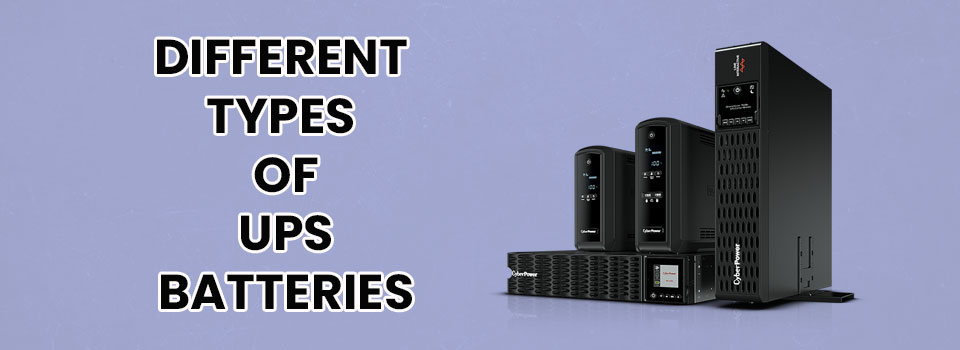Different Types Of UPS Batteries
 A device that stores energy and releases it by transforming chemical energy into electricity is called an electric battery.
A device that stores energy and releases it by transforming chemical energy into electricity is called an electric battery.
During power failures, Uninterruptible Power Supply (UPS) devices keep systems and IT equipment safe and operational in various organizations as well in households. UPS provides enough battery backup power when the flow of electricity drops to an inadequate voltage, or if it stops.
Anything from emergency lighting to full-service data centers can be powered by UPS battery arrays. The finest batteries for providing continuous power include the following characteristics: dependability, longevity, safety, consistency, and affordability.
Types of UPS Batteries
One of the most crucial components of your vital power infrastructure is your UPS system, and the “heart” of your UPS system is its batteries. Batteries are often forgotten, despite the fact that your UPS needs them.
Regardless of the batteries you use, they all gradually lose their capacity to store and transmit power. Even if you adhere to all storage, maintenance, and use instructions, changing UPS batteries on a regular basis will eventually be necessary to get the most out of your UPS.
There are three types of UPS batteries:
- Valve Regulated Lead Acid (VRLA)
- Flooded Cell or VLA batteries
- Lithium Ion batteries.
Valve Regulated Lead Acid (VRLA)
VRLA is the most common battery type seen in UPS machines nowadays. The manner gas is released from the battery is referred to as valve regulated. If the gas pressure in the battery becomes too high, a valve will open and release the gas .
VRLA batteries are less expensive initially, but their lifespan is only about 5 years. Additionally, this type of battery requires less maintainance than flooded cell batteries.
Flooded, or Wet Cell
Flooded cell batteries(VLA batteries) are extremely durable, with a lifespan of up to 20 years. The battery is made up of electrolyte acid-flooded thick lead-based plates. Because of the potential chemical risks, this type of battery requires additional safety precautions. They’re also more expensive up front than other batteries. VLA batteries have become less popular in recent years due to their high initial expense and the dangers they represent.
Lithium Ion
Lithium-Ion batteries have the advantage of being tiny and light weight, as well as having battery management rather than merely monitoring built in. This controls charge current, voltage, and cell voltage balance, as well as adjusting for overheating by disconnecting single batteries or strings if temperatures reach too high.
Compared with other traditional battery technology, lithium-ion batteries charge faster, last longer, and have a higher power density for more battery life and need low maintenance.
The disadvantage of this sort of battery is that it is more expensive than the other types
It’s just as vital to understand your UPS battery options and how to manage them as it is to understand your machine’s options. Contact Mukul Metal Works today to speak with one of our experts about how to best manage the life and replacement of your UPS battery.